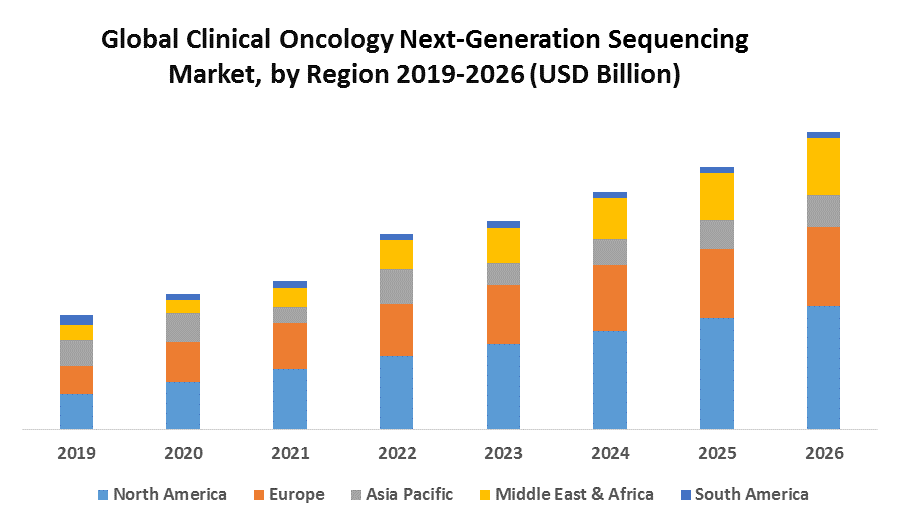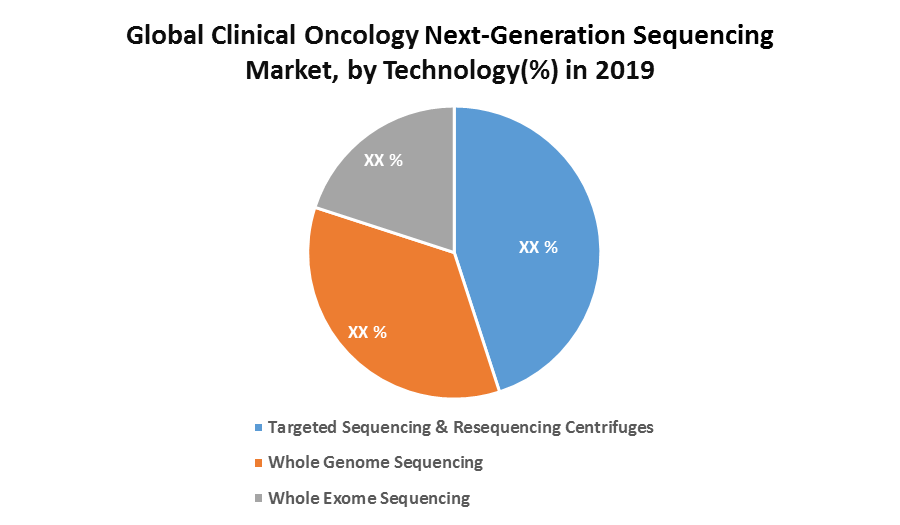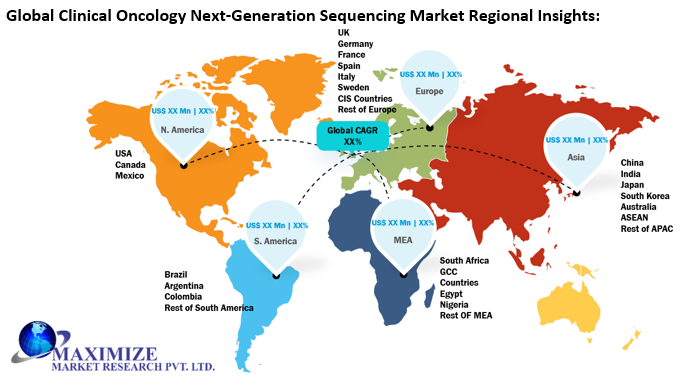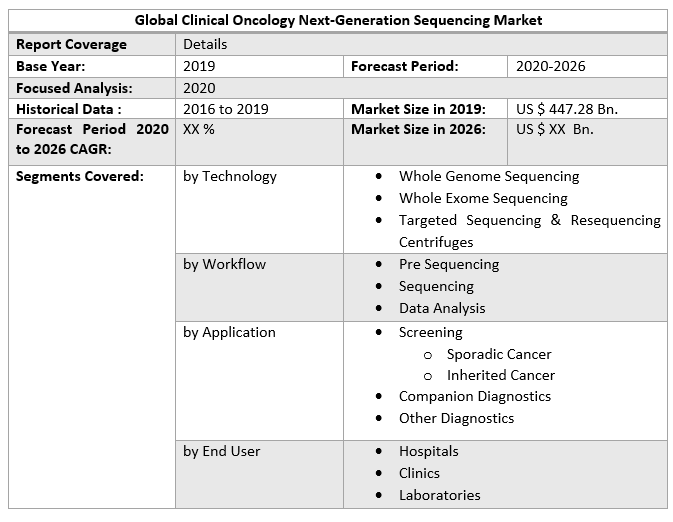Global Clinical Oncology Next-Generation Sequencing Market size was valued at US $ 447.28 Bn.in 2019 and the total revenue is expected to grow at XX% through 2020 to 2026, reaching nearly US$ XX Bn.
The global Clinical Oncology Next-Generation Sequencing market report is a comprehensive analysis of the industry, market, and key players. The report has covered the market by demand and supply-side by segments. The global Clinical Oncology Next-Generation Sequencing report also provides trends by market segments, technology, and investment with a competitive landscape.
 To know about the Research Methodology :- Request Free Sample Report
To know about the Research Methodology :- Request Free Sample Report
Global Clinical Oncology Next-Generation Sequencing Market Overview:
Next-generation sequencing is a technique for sequencing DNA or RNA that allows several reactions to be carried out simultaneously. One of the most significant uses of next-generation sequencing in oncology. NGS has revolutionized cancer genetics in recent years by supplying researchers with access to genomic and transcriptomic data.
Oncology screening for therapeutic use includes next-generation sequencing of tumor and germline DNA. As the incidence of cancer rises, so does the need for early diagnosis to carry out the targeted treatment.
Kits and reagents, services, sequencing systems, and sequencing materials are all available for clinical oncology next-generation sequencing. The demand for sequencing kits and reagents is predicted to expand significantly in the coming years.
Global Clinical Oncology Next-Generation Sequencing Market Dynamics:
Drivers:
During the projected period, the rising prevalence of cancer and technical advances in the field of next-generation sequencing, the clinical oncology next-generation sequencing market is expected to lead in the coming years. Furthermore, over the projected era, an improvement in the preference for NGS over single-gene research is projected to provide substantial market growth opportunities.
According to the American Cancer Society, 1.7 million additional cancer cases and 0.6 million cancer deaths occurred in the United States in 2019. Lung, prostate, bladder, and female breast cancer are the four most prevalent forms of cancer globally, accounting for 43 percent of all new cancer cases. As a result, the global increase in cancer occurrence rates is expected to fuel demand for clinical oncology next-generation sequencing.
Companies that specialize in clinical oncology next-generation sequencing is rapidly investing in workflow automation to improve accuracy and reduce sample-to-sample variability. Sophia Genetics, for example, is invested in data-driven medicine, which aims to automate DNA sequencing to help diagnose and treat patients.
The global clinical oncology next-generation sequencing market is also being driven by increased investments in oncology research. Cancer Research UK spent US$ 262.90 million in firms pursuing new oncology therapies in 2019.
Restraints:
There are a few factors that are likely to impede the overall development of the clinical oncology next-generation sequencing industry, including high costs associated with the establishment of sequencing platforms, poor outsourcing service efficiency, and insufficient availability of sequencing platforms in certain regional markets.
Global Clinical Oncology Next-Generation Sequencing Market Segment Analysis:
Based on Technology, the targeted sequencing resequencing segment experienced significant growth with a sales share of over 72 % in 2020. Targeted cancer sequencing panels tend to cut down on the expense, time, and volume of data evaluated during tumor sample sequencing. Furthermore, targeted panels' ability to identify malignant tumors improves their therapeutic effectiveness. NGS panels are clinically effective in 64 percent of cancer cases, according to a report conducted in JCO Precision Oncology, 2020.
 Based on Workflow, the sequencing was the most profitable workflow segment, accounting for more than 54% of total revenue. Sequencing is a crucial phase in the workflow that requires the use of specialized platforms. The segment's development is also aided by a spike in the number of cancer sequencing programs. The pre-sequencing section is driven by key players' efforts to reduce the expense of NGS library planning. The use of NGS data analysis is expected to accelerate. The segment's development is fueled by key industry players' efforts to create sophisticated analytical tools. The Pan-Cancer Analysis of Whole Genomes (PCAWG) Consortium sequenced over 2,600 tumor samples from 38 different cancer types.
Based on Workflow, the sequencing was the most profitable workflow segment, accounting for more than 54% of total revenue. Sequencing is a crucial phase in the workflow that requires the use of specialized platforms. The segment's development is also aided by a spike in the number of cancer sequencing programs. The pre-sequencing section is driven by key players' efforts to reduce the expense of NGS library planning. The use of NGS data analysis is expected to accelerate. The segment's development is fueled by key industry players' efforts to create sophisticated analytical tools. The Pan-Cancer Analysis of Whole Genomes (PCAWG) Consortium sequenced over 2,600 tumor samples from 38 different cancer types.
Based on Application, the screening accounted for the highest revenue share of over 79 percent. NGS-based research is now thought to be the most effective means of identifying genetic changes that can be exploited for therapeutic advantage in cancer patients. This technology enables doctors to test several gene mutations at the same time. The adoption of NGS for companion diagnostics is expected to be boosted by ongoing product creation and alliances and partnerships among key players.
Based on End User, the laboratories segment dominated the industry over a forecast period, accounting for more than 65 percent of total sales. Setting up dynamic workflows in laboratories is a time-consuming process. As a result, the majority of specialized laboratories have generated pre-existing workflows based on standard procedures. Furthermore, with the rapid production and release of NGS assays for clinical use, detailed protocols for procedures involving NGS testing have been established. As a result, the majority of FDA-approved assessments use proven controls, criteria, and performance characteristics to show the findings' validity.
Global Clinical Oncology Next-Generation Sequencing Market Regional Insights:
With a market share of more than 49%, North America led the clinical oncology NGS market in 2019. This growth can be due to the US government efforts to boost cancer screening diagnosis. The National Cancer Institute's Cancer Target Discovery and Development Network is made up of 12 cancer centers from around the country, including Johns Hopkins University, Dana-Farber Cancer Institute, and others. The development of the regional market is also due to the existence of many labs, research schools, and hospitals that provide NGS-based facilities for early cancer detection and care.
For example, Cancer Predisposition Panel tests from EasyDNA Canada, a Toronto-based DNA testing firm, use NGS technologies to identify mutations in 98 genes linked to 25 hereditary cancers. The test aids in the detection of people who are at an increased risk of contracting cancer later in life.
Due to ongoing developments in the healthcare and pharmaceutical industries, as well as improved reimbursement policies, Asia Pacific is projected to rise at the fastest pace.
 The objective of the report is to present a comprehensive analysis of the global Clinical Oncology Next-Generation Sequencing market to the stakeholders in the industry. The past and current status of the industry with the forecasted market size and trends are presented in the report with the analysis of complicated data in simple language. The report covers all the aspects of the industry with a dedicated study of key players that include market leaders, followers, and new entrants.
The objective of the report is to present a comprehensive analysis of the global Clinical Oncology Next-Generation Sequencing market to the stakeholders in the industry. The past and current status of the industry with the forecasted market size and trends are presented in the report with the analysis of complicated data in simple language. The report covers all the aspects of the industry with a dedicated study of key players that include market leaders, followers, and new entrants.
PORTER, SVOR, PESTEL analysis with the potential impact of micro-economic factors of the market have been presented in the report. External as well as internal factors that are supposed to affect the business positively or negatively have been analyzed, which will give a clear futuristic view of the industry to the decision-makers.
The report also helps in understanding the global Clinical Oncology Next-Generation Sequencing market dynamics, structure by analyzing the market segments and project the global Clinical Oncology Next-Generation Sequencing market size. Clear representation of competitive analysis of key players by product, price, financial position, product portfolio, growth strategies, and regional presence in the global Clinical Oncology Next-Generation Sequencing market make the report investor’s guide.
Global Clinical Oncology Next-Generation Sequencing Market Key Developments:
The Ion Torrent Genexus System, a fully integrated next-generation sequencing (NGS) platform with an automatic specimen-to-report workflow that produces data in a single day, was launched by Thermo Fisher Scientific in November 2019.
Resolution Bioscience, Inc. signed an agreement with LabCorp in February 2020 to expand the use of its Resolution ctDx Lung assay to physicians and patients.
The Oncomine Dx Aim Test, an NGS-based companion diagnostic (CDx) test to detect RET fusion-positive, metastatic non-small cell lung cancer (NSCLC) patients undergoing GAVRETO (pralsetinib), a targeted therapy created by Blueprint Medicines, obtained premarket clearance from the US FDA in September 2020.
Illumina announced several oncology collaborations in January 2021, including Merck, Myriad Genetics, Kura Oncology, and Bristol Myers Squibb, to extend the use and scope of its TruSight Oncology pan-cancer assay.
Thermo Fisher Scientific and SPT Labtech reached a co-marketing agreement in January 2021 to lower the cost of NGS library preparation for cancer, infectious diseases, and other health conditions.
CopyKAT, a novel computational technique created by MD Anderson Cancer Center scientists in January 2021, will distinguish between normal and cancer cells in a tumor.
Congenica teamed up with Gabriel Precision Oncology Ltd. in February 2021 to develop an automatic clinical oncology interpretation computing platform.
For more information of visit:https://www.maximizemarketresearch.com/market-report/global-clinical-oncology-next-generation-sequencing-market/100383/
Global Clinical Oncology Next-Generation Sequencing Market Scope:
Inquire before buying
 Global Clinical Oncology Next-Generation Sequencing Market, by Region
Global Clinical Oncology Next-Generation Sequencing Market, by Region
• North America
• Europe
• Asia Pacific
• The Middle East and Africa
• South America
Global Clinical Oncology Next-Generation Sequencing Market Key Players
• Illumina, Inc.
• QIAGEN
• Thermo Fisher Scientific, Inc.
• F. Hoffman-La Roche Technologies
• Agilent Technologies
• Myriad Genetics
• Foundation Medicine
• Pacific Bioscience
• Oxford Nanopore Technologies Ltd.
• Beijing Genomics Institute (BGI)
• Perkin Elmer, Inc.
• Paradigm Diagnostics
• Caris Life Sciences
• Partek, Inc.
• Eurofins Scientific S.E.
• Bio Rad Laboratories, Inc.
• Other Key Players
This Report Is Submitted By : Maximize Market Research Company
Customization of the report:
Maximize Market Research provides free personalized of reports as per your demand. This report can be personalized to meet your requirements. Get in touch with us and our sales team will guarantee provide you to get a report that suits your necessities.
About Maximize Market Research:
Maximize Market Research provides B2B and B2C research on 20,000 high growth emerging opportunities technologies as well as threats to the companies across the Healthcare, Pharmaceuticals, Electronics Communications, Internet of Things, Food and Beverages, Aerospace and Defense and other manufacturing sectors.








